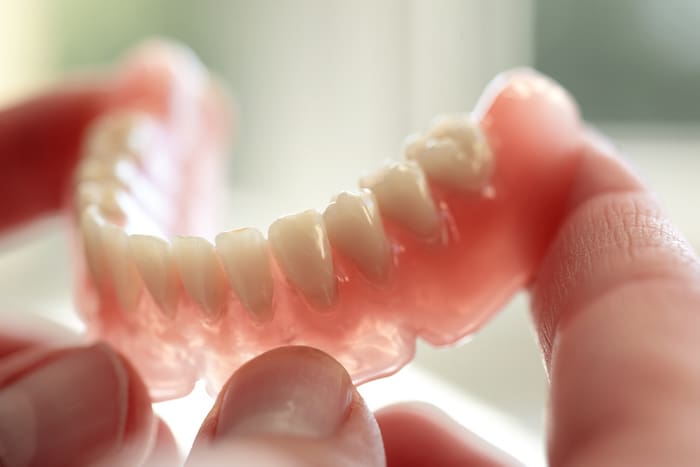Dentures and partials are important tools for replacing missing teeth. Tyler Family Dental provides both options as part of our restorative dentistry services. Dentures and partials can replace multiple missing teeth or even a full arch of teeth. With advancements in modern dentistry, dentures look and feel more natural than ever. Whenever possible, we recommend dentures supported by dental implants.

Getting Dentures in Tyler, TX
Getting dentures is a multi-step process that can significantly improve your ability to chew, speak, and smile confidently. Whether you are getting partial or full dentures, the process typically involves several appointments with your dentist or prosthodontist to ensure a perfect fit and comfortable experience.
1. Initial Consultation and Examination
The first step in getting dentures is an initial consultation with your dentist. During this visit, your dentist will examine your mouth, gums, and remaining teeth to assess your oral health. They will also discuss your specific needs, including whether you require full dentures (if you’re missing all of your teeth) or partial dentures (if some natural teeth remain).
Your dentist may take X-rays or impressions of your teeth and gums to clearly understand your oral structure. This information helps them plan the best type of dentures for your situation. If you need extractions (removal of any remaining teeth), your dentist will also schedule these procedures.
2. Tooth Extraction (If Necessary)
If you still have some teeth that need to be removed, the next step is tooth extraction. This is often required for full dentures, as they replace all the teeth in either the upper or lower arch of your mouth. Your dentist will perform the extractions; you’ll need time to heal before proceeding with the denture-fitting process.
Healing can take several weeks to a few months, depending on how many teeth were removed and how your gums respond. During this period, your gums will shrink and change shape, which is important for ensuring a snug fit for future dentures.
3. Taking Impressions
Once your mouth has healed (or if you don’t need extractions), your dentist will take detailed impressions of your gums and any remaining teeth. These impressions serve as a blueprint for creating your custom dentures. Dentures must fit your mouth perfectly to function well and feel comfortable, so the dentist will pay close attention to capturing every detail of your oral structure.
Sometimes, your dentist might use a wax try-in model based on your impressions. This is a temporary set of wax dentures that allows you to try out the shape and fit before the final dentures are made. Adjustments can be made at this stage to ensure your final dentures will fit perfectly.
4. Fitting and Adjustments
Once your custom dentures are ready, you’ll return to the dentist for a fitting. During this appointment, the dentist will place the dentures in your mouth and assess their fit, bite, and overall comfort. They’ll make any necessary adjustments to ensure the dentures are snug but not too tight and that you can chew and speak comfortably.
You may need a few follow-up appointments to fine-tune the fit of your dentures. It’s common to experience some minor soreness or discomfort as your mouth adjusts to the new dentures, but this usually improves with time and adjustments.
Implant-Supported Dentures
Implant-supported dentures offer a stable and secure option for people who need dentures but want more support than traditional ones provide. Unlike regular dentures that rest on the gums, implant-supported dentures are anchored to dental implants, which are small titanium posts surgically placed into the jawbone. These dentures provide a more natural feel and better functionality, making eating, speaking, and confidently smiling easier.
The process of getting implant-supported dentures begins with a consultation. Your dentist will evaluate your oral health and jawbone density to determine whether you are a good implant candidate. If you have sufficient bone structure, the dentist will place the implants. In cases where bone loss has occurred, a bone graft may be needed before implants can be placed.
Titanium posts are inserted into the jawbone at specific locations during the implant surgery. The implants need time to fuse with the bone in osseointegration, which can take several months. This step ensures the implants are securely anchored and can support the denture.
Once the implants fully integrate with the bone, your dentist will attach abutments (connectors). These abutments act as the attachment points for the dentures. After this, your custom dentures will be fitted to snap onto the abutments, creating a secure and comfortable fit.
Implant-supported dentures can be fixed (permanent) or removable, depending on your preference and needs. They offer a more stable solution than traditional dentures, preventing slipping or shifting in the mouth. This stability allows for better chewing and speaking, improving overall comfort and function.
With proper care, implant-supported dentures can provide a long-lasting, durable solution for replacing missing teeth while maintaining a natural appearance.
Schedule an Appointment
We provide multiple types of dentures to ensure that you get the best solution for your needs. Call our office or schedule an appointment online to get started.
